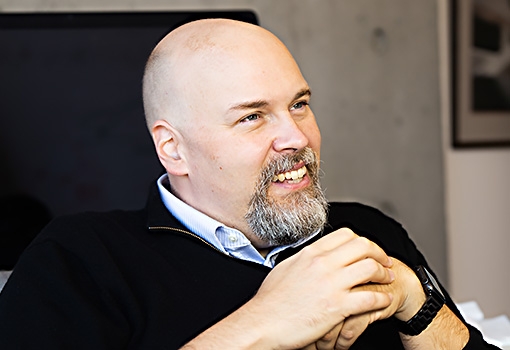Every year, the Association of Computing Machinery (ACM) recognizes the top one percent of its members for outstanding work in computing and information technology and/or outstanding service to ACM and the larger computing community. Among those honored for their accomplishments in 2022 is UC Santa Barbara computer science professor Timothy Sherwood. He joins fifty-six association members from around the globe as new Fellows for 2023.
“We are pleased to offer congratulations to Tim Sherwood for being honored among the top ten percent of ACM members,” said Tresa Pollock, interim dean of the UCSB College of Engineering. “Tim is not only a brilliant and visionary computer scientist, which earned him this recognition, but also a personable and multi-faceted member of the COE faculty, who is dedicated to serving his students and the greater UCSB community.”
"I am honored and humbled to receive this recognition from my fellow computer scientists, and so deeply appreciative of the support I have received from the outstanding students, collaborators, and staff at UC Santa Barbara," Sherwood said. "The collaborative spirit of this place can be found throughout my work ,and I can't help but think that there is a certain type of engineering research that is really only possible to do here."
ACM Fellows are recognized for their “wide-ranging and fundamental contributions in disciplines including cybersecurity, human-computer interaction, mobile computing, and recommender systems, among many other areas,” according to an ACM news release, “The accomplishments of the 2022 ACM Fellows make possible the computing technologies we use every day.”
One emerging focus of Sherwood’s recent research is temporal computing, in which a value is expressed not as binary strings of ones and zeroes, but rather, as the amount of time elapsed between some reference point and when an event, such as the pulse of a signal, occurs. The process, he says, “may be much closer to how your brain works” and might allow general machine-learning operations to be done much more efficiently.
Sherwood is well known for his work on cyber-security, especially as it relates to hardware. Fifteen years ago, researchers in his lab, called ArchLab, began investigating the question of how exactly information flows through hardware. The work led them to discover “all kinds of security vulnerabilities, including some that hadn’t been invented yet," he said.
Several years later, two huge vulnerabilities, Spectre and Meltdown, came along and caused havoc. Sherwood recalls the time well: “Digging into our curiosity-driven question had made us the only people in the world who knew how to reason through something like that, so suddenly it went from, ‘This is an interesting little thing’ to ‘Oh my gosh, can you help us?’”
Firmly committed to diversity in engineering and STEM more broadly, Sherwood co-founded the interdisciplinary student-driven program SEEDS (with Center for Black Studies research director and associate vice chancellor for Diversity, Equity and Inclusion Sharon Tettegah), spent nearly five years as Associate Vice Chancellor for Research, and is currently serving as interim dean in the College of Creative Studies. He was named an IEEE fellow in 2022, in recognition of his “contributions to computer system security and performance analysis.” Papers produced by him and his students regularly win top awards at the industry’s most important conferences. In the past five years, ArchLab researchers have published/presented on the risk associated with computer architecture, temporal computing with superconductor electronics, and heterogeneous materials for improved energy efficiency in computing. Sherwood also received the Maurice Wilkes Award in 2016, given annually to recognize an outstanding contribution to computer architecture made by an individual in the first twenty years of their career. He was recognized for contributions to novel program analysis advancing architectural modeling and security.”
“Computing’s most important advances are often the result of a collection of many individual contributions, which build upon and complement each other,” explained ACM President Yannis Ioannidis. “But each individual contribution is an essential link in the chain. The ACM Fellows program is a way to recognize the women and men whose hard work and creativity happens inconspicuously but drives our field. In selecting a new class of ACM Fellows each year, we also hope that learning about these leaders might inspire our wider membership with insights for their own work.”
ACM Fellows are nominated by their peers, and nominations are reviewed by a distinguished selection committee. The 2022 Fellows represent universities, corporations, and research centers in Canada, Chile, China, France, Germany, Israel, the Netherlands, Spain, Switzerland, and the United States.

Computer science professor Tim Sherwood. Photograph by Lilli McKinney
